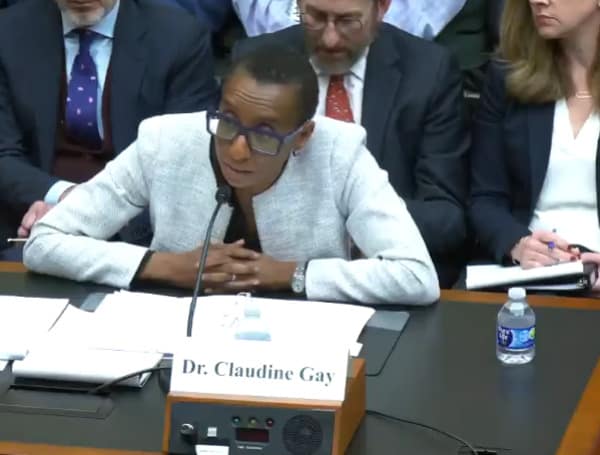Some of the same hard leftists who have been on the forefront in denying free speech rights to those deemed politically incorrect have now begun to champion the First Amendment in defense of those who advocate the killing of Jews.
Among the worst offenders is Harvard’s President Claudine Gay, who for years—both as dean of the faculty and as president of Harvard—has championed the idea that it is more important for students to feel safe, and not have their ideas challenged, than for free expression to be allowed on campus. The bureaucracy through which this notion operates is Diversity, Equity and Inclusion (DEI), which punishes microaggressions and other forms of speech that certain students claim makes them feel unsafe. The entire woke progressive movement rests on restricting expression that alienates or upsets protected minorities.
In her disastrous testimony in front of Congress, President Gay swore under oath that we at Harvard “embrace a commitment to free expression.” If only that were so. For years now Harvard has been suppressing expression deemed by some to be politically incorrect, as reflected by its last-place ranking among American universities in protecting free speech by the Foundation for Individual Rights and Expression. Lectures have been canceled because of content some deemed offensive. Students have been reprimanded for microaggressions. Acceptances have been rescinded for allegedly racist or sexist speech engaged in by high school students. A former president—Lawrence Summers—was forced to resign over comments about women in engineering. An atmosphere of intimidation has permeated the campus. Freedom of expression was dying a slow death at the university whose motto is “Veritas” but whose actions have suggested “Pravda.”
Then suddenly, following the barbarous Hamas attacks of October 7 and the flurry of antisemitic rhetoric immediately following them, the same groups that denied free speech to those who criticize minorities protected by DEI have discovered the First Amendment as a protection for those who are calling for the death of Jews.
“Free speech for me, but not for thee” has been the unspoken mantra of the hard Left. Or, more specifically, “freedom of speech to make Jews feel unsafe but not to make favored minorities uncomfortable.”
There are two principled responses universities may take to this unequal application of freedom of expression. The first, and the one which I personally prefer, is to allow total free speech consistent with the First Amendment on all campuses. This would permit advocacy, but not incitement, against all and any groups. This pure and equal approach to the First Amendment is what the Supreme Court has demanded of the government in most circumstances. It allowed Nazis to march in Skokie, Illinois, and communists to advocate the overthrow of the government. It does not allow direct and immediate incitement to violence. The line between advocacy and incitement has been a difficult one to draw since the Supreme Court mandated that distinction. But it is the law, in theory if not always in practice.
The First Amendment is not directly applicable to private universities and other non-governmental organizations. Universities remain free to impose speech codes and other limitations on free expression that they feel enhance the learning experience and the safety of students. Public universities have greater restrictions, but they too have some flexibility in adapting the First Amendment to the special needs of educational institutions.
If private universities, such as Harvard, MIT, and Penn decide not to adhere to the standards of the First Amendment and impose limitations on free speech, they should do so equally and without preference for some groups over others. Few universities, if any, satisfy that criteria. Most prefer certain minorities over others, as well as certain political views over others.
If Harvard had a history of applying a single standard, its president would have had an easy time answering the question of whether Harvard’s rules prohibit the advocacy of genocide against the Jews. Here’s what she would have been able to say: “under the standards Harvard has applied in the past, there is no doubt that calling for genocide against the Jews is a clear violation of Harvard rules.” But she refused to acknowledge the truth—that Harvard has not embraced “a commitment to free expression” equally for all of its students and faculty.
It can be hoped that perhaps the Harvard Corporation’s decision to retain President Gay will actually result in a change in its policies toward free speech. Perhaps Harvard will finally “embrace a commitment to free expression” for all. This may be wishful thinking, especially in light of the continuing influence of the DEI bureaucracy over who can say what about whom, without fear of university reprisal. But it is the right thing to do.
Alan Dershowitz is professor emeritus at Harvard Law School and the author of “Get Trump,” “Guilt by Accusation” and “The Price of Principle.” Andrew Stein, a Democrat, served as New York City Council president, 1986-94. This piece is republished from the Alan Dershowitz Newsletter.
The views and opinions expressed in this commentary are those of the author and do not reflect the official position of the Tampa Free Press.
Android Users, Click To Download The Free Press App And Never Miss A Story. Follow Us On Facebook and Twitter. Sign up for our free newsletter.
We can’t do this without your help. Visit our GiveSendGo page and donate any dollar amount; every penny helps.

